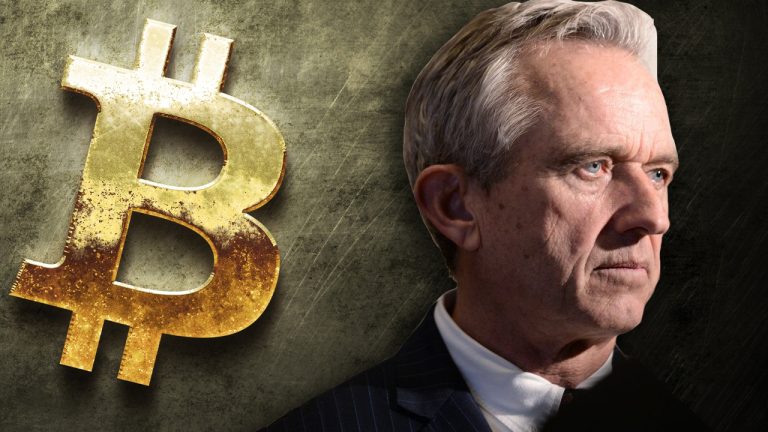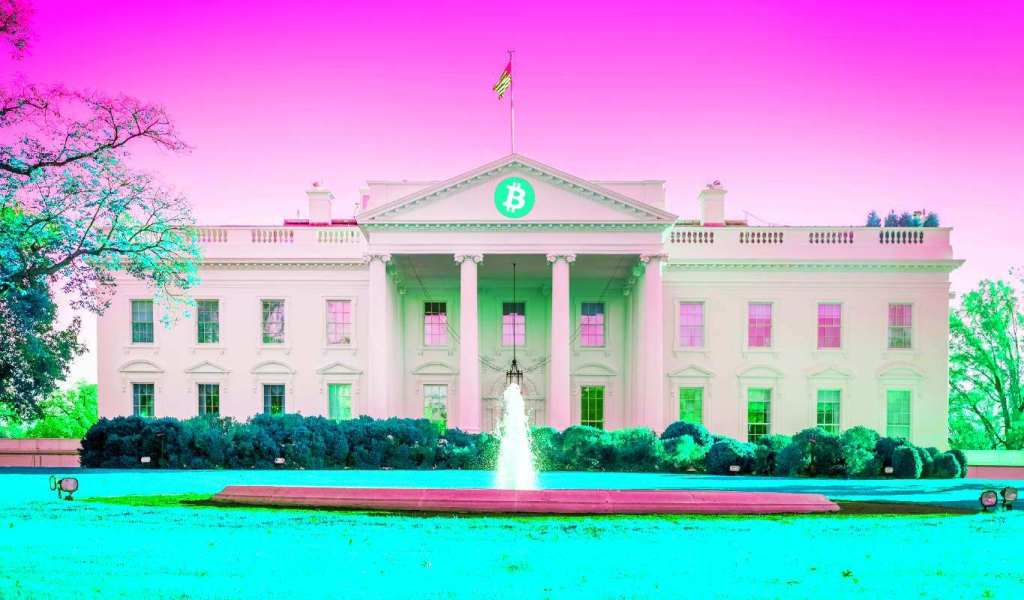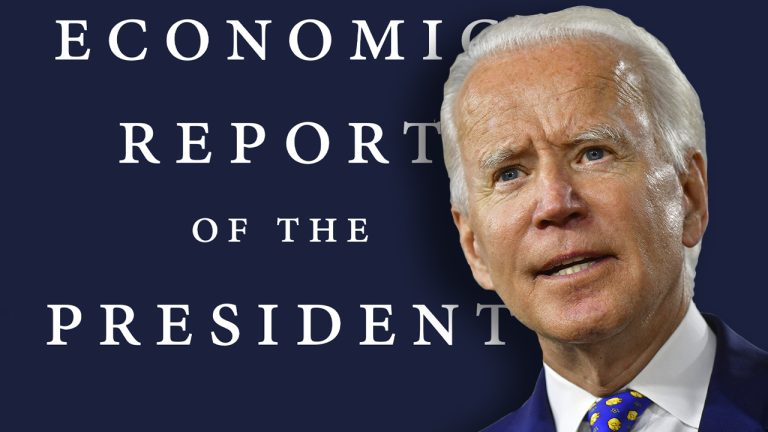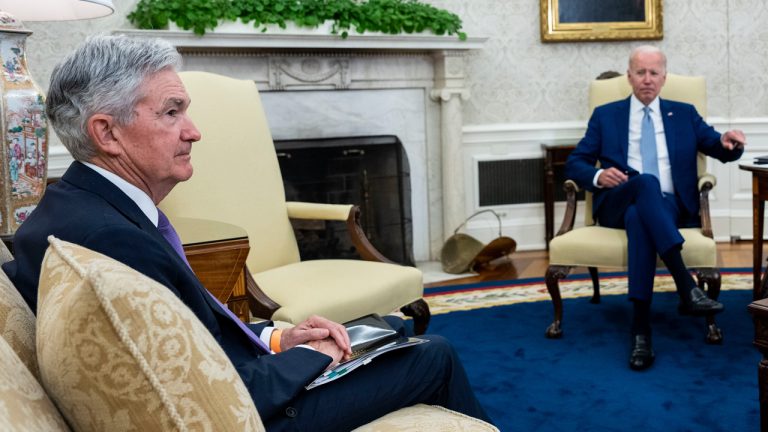 On Monday, Robert F. Kennedy Jr. once again cautioned the public to be wary of central bank digital currencies (CBDCs), and he insisted that the Biden administration has launched a “steady barrage of hostile broadsides against cryptocurrencies.” Kennedy, who recently filed to run for president of the United States in the 2024 election as a […]
On Monday, Robert F. Kennedy Jr. once again cautioned the public to be wary of central bank digital currencies (CBDCs), and he insisted that the Biden administration has launched a “steady barrage of hostile broadsides against cryptocurrencies.” Kennedy, who recently filed to run for president of the United States in the 2024 election as a […]
President Biden urges technology companies to prioritize secure AI products before public release, stressing the need to address potential risks to society, national security and the economy.
United States President Joe Biden stated on Tuesday that the safety of artificial intelligence (AI) is still uncertain, and emphasized that technology firms should ensure their products are secure before releasing them to the public.
During a meeting with science and technology advisers, Biden acknowledged that AI could be beneficial in tackling issues such as disease and climate change. However, he stressed the significance of addressing possible risks to society, national security and the economy.
At the beginning of a meeting with the President’s Council of Advisors on Science and Technology, he stated that technology companies must ensure their products are secure before releasing them to the public. When questioned about the potential hazards of AI, he replied, “It is yet to be determined. There is a possibility.“
According to the president, social media has already demonstrated the negative impact that powerful technologies can have in the absence of appropriate measures to protect against them. “Absent safeguards, we see the impact on the mental health and self-images and feelings and hopelessness, especially among young people,” Biden said.
Related: Multiple US state regulators allege AI trading DApp is a Ponzi scheme
He repeated his call for the U.S. Congress to approve non-partisan privacy laws that limit the personal data gathered by technology firms, prohibit child-targeted advertising, and gives priority to health and safety in product development.
The Center for Artificial Intelligence and Digital Policy, a technology ethics organization, recently urged the U.S. Federal Trade Commission to prevent OpenAI from releasing new commercial versions of GPT-4, a language model that has both impressed and alarmed users due to its human-like capacity to create written responses to prompts.
Magazine: All rise for the robot judge: AI and blockchain could transform the courtroom
 On Sunday, Saudi Arabia and several major oil producers announced their plan to cut oil production by 1.15 million barrels per day, starting in May and continuing until the end of 2023. According to the Saudi Energy Ministry, the move was coordinated with some members of the Organization of the Petroleum Exporting Countries (OPEC) and […]
On Sunday, Saudi Arabia and several major oil producers announced their plan to cut oil production by 1.15 million barrels per day, starting in May and continuing until the end of 2023. According to the Saudi Energy Ministry, the move was coordinated with some members of the Organization of the Petroleum Exporting Countries (OPEC) and […]
The White House isn’t doing any favors for derivatives traders by turning a blind eye to the biggest players in the space.
The White House released its annual economic report on March 20, and it dedicated an entire section to digital assets.
The authors should be commended for doing so. I largely agree with the report’s assessment that certain aspects of the digital asset ecosystem are causing problems for consumers, financial systems and the environment.
However, as a builder in the digital asset space, I cannot disagree more with its conclusion that “crypto assets currently do not offer widespread economic benefits.”
To understand how the White House plans to regulate digital assets, it’s important to examine what was left out of the White House report. A particularly out-of-touch piece of data that made the report was a list titled, “Top Ten Crypto Derivative Platforms by Open Interest.” It included offshore exchanges including BingX, Deepcoin and BTCC Futures.

While most digital asset proponents would agree with the report that these exchanges are not reputable by any means, and open interest is a metric that is trivially easy to manipulate, it’s neither here nor there. The real issue is why the White House report chose to focus on offshore exchanges that have no checks and balances and aren’t even open to United States-based users.
What’s more revealing is the fact that they choose to completely ignore the largest derivatives product that is available to U.S.-based users, one that has been vetted and received approval from the Commodities Futures Trading Commission to launch in a safe and regulated manner: the Bitcoin (BTC) and Ether (ETH) futures offered by the Chicago Mercantile Exchange (CME).
Related: What Paul Krugman gets wrong about crypto
The CME is an entity that is fully compliant with all U.S. laws and regulations and, with the recent launch of the Micro Bitcoin and Micro Ether futures, has made it possible for retail investors to access a safe, regulated and U.S.-based futures derivative product.
Why would they choose to omit the mention of the CME?
Could it be because the CME can only list commodities, putting into question the Securities and Exchange Commission’s position that ETH is a security?
Furthermore, none of the platforms mentioned by the White House have any name recognition among crypto-native investors. While this could be attributed to the fact that there are relatively few derivative exchanges on the market and that none of these exchanges seem to have filled the void left by FTX, another omission is very telling.
The White House report also fails to mention Deribit, the largest options exchange by volume and open interest. Based in the Netherlands but unavailable to U.S. users, the company is focused on education and outreach and is far more transparent than most on the market. So, why was it not included?
The White House is purposefully excluding any legitimate businesses from the list of derivative platforms, a position that is likely taken in order to paint digital assets as shadowy, unsafe assets.
Derivatives, such as futures and options, are a core component of any financial system. The U.S. — and White House — would benefit from a thriving digital asset economy that includes derivatives and options markets. And I do agree that the exchanges listed in the White House report are indeed quite risky.
But what the White House is missing is that there is a better alternative, one that cannot be swept under the rug anymore and one that is transparent, noncustodial, cryptographically secure and fully open-source: decentralized finance (DeFi).
DeFi is fully noncustodial and has no intermediaries, so there are no “entities” to regulate because users are always in control of their funds. In addition, most DeFi uses collateral requirements and limits access to leverage: All lending protocols are overcollateralized, and the balance is instantly auditable, as opposed to fractional reserve banking.
Related: Did regulators intentionally cause a run on banks?
The lack of regulatory clarity from the U.S. SEC and CFTC stifles innovation in the derivatives space.
Most DeFi protocols can and should plan to follow the guidelines of self-regulatory organizations such as the Financial Industry Regulatory Authority to protect all users. Clearly stated regulations have a place in any industry, but regulation by enforcement stifles innovation. I’m seeing this firsthand as a builder in the digital asset space, and the lack of clarity is making it impossible for any U.S.-based entity to even tap into the U.S. market.
Digital asset proponents know about previous financial crises. Most of us lived through the hellscape that unfolded post-2008 due to bank deregulation. Our goal is to rebuild the financial infrastructure from the ground up, in the most transparent and securest way possible. DeFi is backed by mathematically unbreakable encryption, and centralized exchanges based offshore are the shadow banks of this generation.
Builders in the DeFi space want to create the most secure financial system in history. We want to empower citizens of the world, not private banks or runaway financiers.
And despite what U.S. regulators may think, we are willing to work with governments, central banks and regulators. We just need to know you’re arguing in good faith.
This article is for general information purposes and is not intended to be and should not be taken as legal or investment advice. The views, thoughts and opinions expressed are the author’s alone and do not necessarily reflect or represent the views and opinions of Cointelegraph.

A day after Coinbase received an SEC Wells notice, industry commentators weighed in on what recent regulator actions mean for America's crypto future.
The United States' crackdown on cryptocurrencies and firms will only serve to stifle crypto-related innovation and “weaken” the country, said industry pundits in the wake of Coinbase's recent Wells notice.
On March 22, crypto exchange Coinbase became the latest crypto firm to receive a “legal threat” — in the form of a Wells notice, just a month after stablecoin-issuer Paxos received its own in February. Some suggest there could be more to come.
Mati Greenspan, the chief of crypto research firm Quantum Economics said he believes U.S. regulators have been unfriendly to crypto “since the beginning.”
The recent collapses of crypto and startup-friendly banks, including Silvergate, Silicon Valley Bank (SVB) and Signature Bank have been viewed by some as being part of a scheme by regulators to un-bank the crypto sector, dubbed “Operation Choke Point 2.0.”
Meanwhile, a March 20 economic report from the White House turned into a scathing review of the merits of crypto assets, spending almost an entire chapter debunking its “touted” benefits.
Greenspan told Cointelegraph that the rumored action could be underway as crypto is seen as a “threat” to the U.S. dollar’s dominance in global trade — a major and long-standing benefit to the U.S.
Russia, China, and now crypto. Slowly but surely the United States is isolating itself from the global economy. The USD cannot remain the world's reserve currency for much longer under these conditions.
— Mati Greenspan (@MatiGreenspan) March 14, 2023
However, as more are beginning to use crypto for cross-border remittances globally, he warned a crackdown on crypto in the U.S. could actually have the opposite effect on the dollar:
“The surgical removal of cryptocurrencies from the U.S. banking system will only isolate the United States further and weaken the dollar's position as the global reserve currency.”
Adrian Przelozny, CEO of crypto exchange Independent Reserve told Cointelegraph the recent banking sector woes were not due to “any failure in crypto” but caused by banks managing their risks in an "irresponsible way.”
“The White House would be better served to review the practices in the banking industry,” he added.
Speaking about the most recent action against Coinbase, Przelozny said the “adversarial environment for the crypto industry” in the U.S. will push the related “jobs, investment and future innovation” offshore.
“Singapore, Hong Kong and potentially Australia” who are eyeing the benefits of the industry may prove a better home for it and those countries “will reap the economic benefits,” Przelozny said.
Related: Banks and the Fed have a problem — What about crypto?
The exact reasons the regulator is targeting Coinbase are still unclear. The SEC have declined to comment on the matter.
Investments in crypto asset securities can be exceptionally volatile & speculative, & the platforms where investors buy, sell, borrow/lend these securities may lack important protections for investors.
— U.S. Securities and Exchange Commission (@SECGov) March 23, 2023
@SEC_Investor_Ed to investors: exercise caution w/ crypto asset securities.
Michael Bacina, a lawyer and partner at Piper Alderman agreed that a “regulation by enforcement model” will “drive crypto-asset innovation offshore,” and added:
“This is a strange position to adopt given the losses many faced in the last 12 months arose from collapses involving unregulated offshore structures.”
Bacina said for years the industry has asked for clarity on how to comply. He pointed to the recent “telling” comments made by the judge in Voyager Digital’s bankruptcy case which “observed that there is no clear guidance from regulators.”
He added until governments lay out the path to regulatory compliance, offshore jurisdictions will continue to harbor crypto firms “which will cost jobs and raise the risk for consumers and investors.”
Magazine: Unstablecoins: Depegging, bank runs and other risks loom

The Biden Administration just released a new economic report that extensively covers Bitcoin and crypto, mentioning the two terms a whopping 305 times in total. The document is catching waves for stating that “crypto assets to date do not appear to offer investments with any fundamental value” – but that’s just a glimpse of what’s […]
The post White House Says ‘Bitcoin Has Not Announced Plans to Adopt Proof-of-Stake’ in Wild Economic Report appeared first on The Daily Hodl.

The report included 35 pages seemingly aimed at debunking the merits of crypto assets.
Crypto executives have expressed irritation over the latest White House economic report — which notably features an entire chapter dedicated to casting doubts on the merit of digital assets.
The Economic Report of the President, released March 20, marks the first time the White House has included a section on digital assets since it first began issuing the annual economic policy report in 1950.
Co-founder of digital asset investment firm Paradigm, Fred Ehrsam, remarked that 15% of the Economic Report was dedicated to “crypto FUD.”
15% of the annual White House Economic Report is devoted to crypto FUDhttps://t.co/lQlAyXgfyJ pic.twitter.com/RTZacgXSUg
— Fred Ehrsam (@FEhrsam) March 21, 2023
The report includes 35 pages dedicated to debunking the “Perceived Appeal of Crypto Assets” along with a short section on the FedNow payment system and central bank digital currencies (CBDCs).
The report’s main argument is that crypto assets fail to deliver on their “touted” benefits, such as improving payment systems, financial inclusion, and creating mechanisms to transfer value and intellectual property, stating:
“Instead, their innovation has been mostly about creating artificial scarcity in order to support crypto assets’ prices—and many of them have no fundamental value.”
It also argues that cryptocurrencies fail to perform the functions of sovereign money — such as the U.S. dollar — as crypto prices fluctuate too wildly to be a stable store of value, nor can they function as a unit of account or medium of exchange.
The report also takes aim at stablecoins, which it argues are subject to run risks, and is thus too risky to satisfy their role as a “fast payment” instrument.
Blockchain Association CEO Kristin Smith called the latest presidential report “disappointing,” saying it shows that some in the government appear “increasingly allergic” to the burgeoning crypto industry, adding:
“We urge the Biden administration to consider how it will be remembered: as a leader of profound innovation or a roadblock to a global tech revolution.”
Decentralization is also highlighted in the report, which argues that “despite claims of being decentralized and trustless, blockchain-based applications are in practice neither.”
Users access crypto assets by going to a limited set of crypto asset platforms, while a small group of miners performs the majority of mining in most crypto assets, it argues.
Related: House Republicans directly criticize Biden administration for digital asset policies
The latest annual economic policy report was published some two weeks after the collapse of Silvergate Bank, Silicon Valley Bank, and Signature Bank — all three of which served aspects of the crypto industry.
Dan Reecer, chief growth officer at decentralized finance (DeFi) platform Acala Network, claims the report comes “just days” after Operation Chokepoint 2.0 was executed on crypto-friendly banks.
He also noted an “obvious early warning” of an upcoming United States CBDC, or digital dollar, referencing a section of the report that seemingly touts the benefits of a U.S. central bank-controlled currency.
Magazine: Unstablecoins: Depegging, bank runs and other risks loom
 On Monday, U.S. president Joe Biden published the administration’s economic report and addressed the subject of cryptocurrencies. The section titled “The Perceived Appeal of Crypto Assets” describes the currencies as “mostly speculative investment vehicles” that are “unbacked” and “traded without fundamental anchors.” The White House insists that crypto assets do not deliver on their promises […]
On Monday, U.S. president Joe Biden published the administration’s economic report and addressed the subject of cryptocurrencies. The section titled “The Perceived Appeal of Crypto Assets” describes the currencies as “mostly speculative investment vehicles” that are “unbacked” and “traded without fundamental anchors.” The White House insists that crypto assets do not deliver on their promises […] Serving as a committee member of Alchemy Pay’s management and advisory board, and as Global Strategic Adviser to support Alchemy Pay’s expansion and growth in global markets, contributing actively to strategy, compliance and government relations. Alchemy Pay, Singapore based pioneer of the world’s first payment gateway solution to bridge the gap between fiat and crypto […]
Serving as a committee member of Alchemy Pay’s management and advisory board, and as Global Strategic Adviser to support Alchemy Pay’s expansion and growth in global markets, contributing actively to strategy, compliance and government relations. Alchemy Pay, Singapore based pioneer of the world’s first payment gateway solution to bridge the gap between fiat and crypto […] With the Federal Open Market Committee convening on Wednesday and the recent financial troubles facing the U.S. banking system, White House press secretary Karine Jean-Pierre said President Joe Biden has “confidence” in Federal Reserve chair Jerome Powell. Meanwhile, according to the CME Group’s Fedwatch tool, the target rate probability suggests the Fed will raise the […]
With the Federal Open Market Committee convening on Wednesday and the recent financial troubles facing the U.S. banking system, White House press secretary Karine Jean-Pierre said President Joe Biden has “confidence” in Federal Reserve chair Jerome Powell. Meanwhile, according to the CME Group’s Fedwatch tool, the target rate probability suggests the Fed will raise the […]